新起点大学英语
- 格式:doc
- 大小:84.50 KB
- 文档页数:5
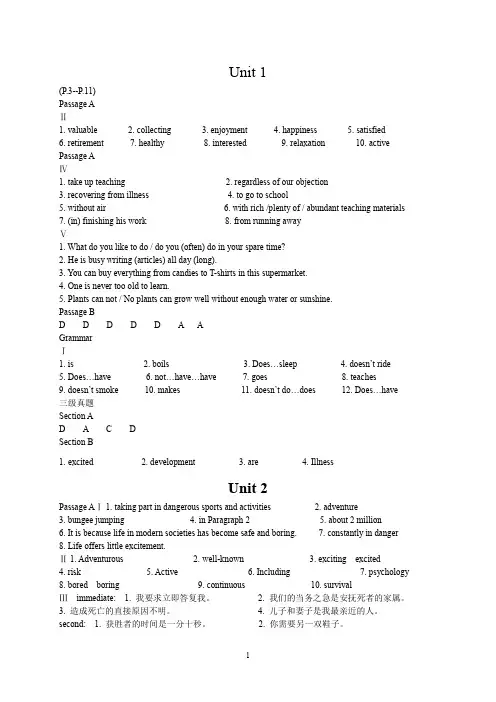
Unit 1(P.3--P.11)Passage AⅡ1. valuable2. collecting3. enjoyment4. happiness5. satisfied6. retirement7. healthy8. interested9. relaxation 10. active Passage AⅣ1. take up teaching2. regardless of our objection3. recovering from illness4. to go to school5. without air6. with rich /plenty of / abundant teaching materials7. (in) finishing his work8. from running awayⅤ1. What do you like to do / do you (often) do in your spare time?2. He is busy writing (articles) all day (long).3. You can buy everything from candies to T-shirts in this supermarket.4. One is never too old to learn.5. Plants can not / No plants can grow well without enough water or sunshine.Passage BD D D D D A AGrammarⅠ1. is2. boils3. Does…sleep4. doesn’t ride5. Does…have6. not…have…have7. goes8. teac hes9. doesn’t smoke 10. makes 11. doesn’t do…does 12. Does…have三级真题Section AD A C DSection B1.excited2. development3. are4. IllnessUnit 2Passage AⅠ 1. taking part in dangerous sports and activities 2. adventure3. bungee jumping4. in Paragraph 25. about 2 million6. It is because life in modern societies has become safe and boring.7. constantly in danger8. Life offers little excitement.Ⅱ 1. Adventurous 2. well-known 3. exciting excited4. risk5. Active6. Including7. psychology8. bored boring9. continuous 10. survivalⅢimmediate: 1. 我要求立即答复我。
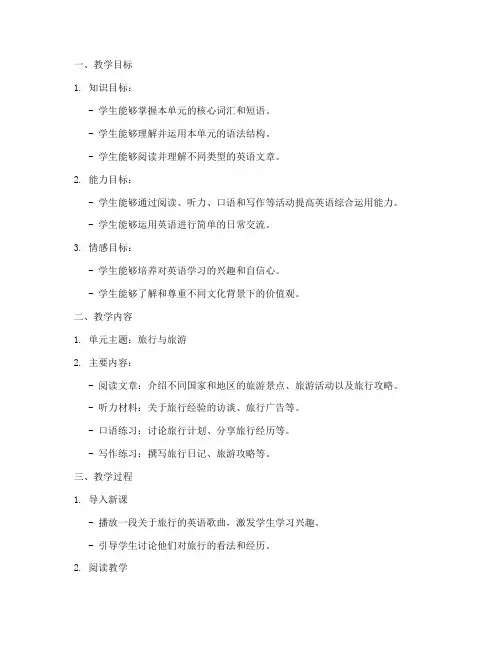
一、教学目标1. 知识目标:- 学生能够掌握本单元的核心词汇和短语。
- 学生能够理解并运用本单元的语法结构。
- 学生能够阅读并理解不同类型的英语文章。
2. 能力目标:- 学生能够通过阅读、听力、口语和写作等活动提高英语综合运用能力。
- 学生能够运用英语进行简单的日常交流。
3. 情感目标:- 学生能够培养对英语学习的兴趣和自信心。
- 学生能够了解和尊重不同文化背景下的价值观。
二、教学内容1. 单元主题:旅行与旅游2. 主要内容:- 阅读文章:介绍不同国家和地区的旅游景点、旅游活动以及旅行攻略。
- 听力材料:关于旅行经验的访谈、旅行广告等。
- 口语练习:讨论旅行计划、分享旅行经历等。
- 写作练习:撰写旅行日记、旅游攻略等。
三、教学过程1. 导入新课- 播放一段关于旅行的英语歌曲,激发学生学习兴趣。
- 引导学生讨论他们对旅行的看法和经历。
2. 阅读教学- 学生自主阅读课文,了解文章大意。
- 教师引导学生分析文章结构、段落大意和关键词汇。
- 学生分享阅读心得,教师点评并纠正错误。
3. 听力教学- 学生听录音,完成听力练习。
- 教师讲解听力技巧,帮助学生提高听力水平。
- 学生复述听力内容,教师点评并纠正错误。
4. 口语教学- 学生分组讨论旅行计划,分享旅行经历。
- 教师引导学生运用所学词汇和语法进行口语交流。
- 学生进行角色扮演,模拟旅行场景。
5. 写作教学- 学生根据所学内容,撰写一篇关于旅行的日记或攻略。
- 教师讲解写作技巧,帮助学生提高写作水平。
- 学生互评作文,教师点评并纠正错误。
6. 总结与拓展- 教师总结本单元所学内容,强调重点词汇和语法。
- 学生分享学习心得,提出疑问。
- 教师布置课后作业,拓展学生知识面。
四、教学评价1. 课堂表现:观察学生在课堂上的参与程度、回答问题的准确性、口语表达能力等。
2. 作业完成情况:检查学生课后作业的完成质量,了解学生对知识的掌握程度。
3. 期末考试:通过书面考试和口语测试,全面评估学生的学习成果。
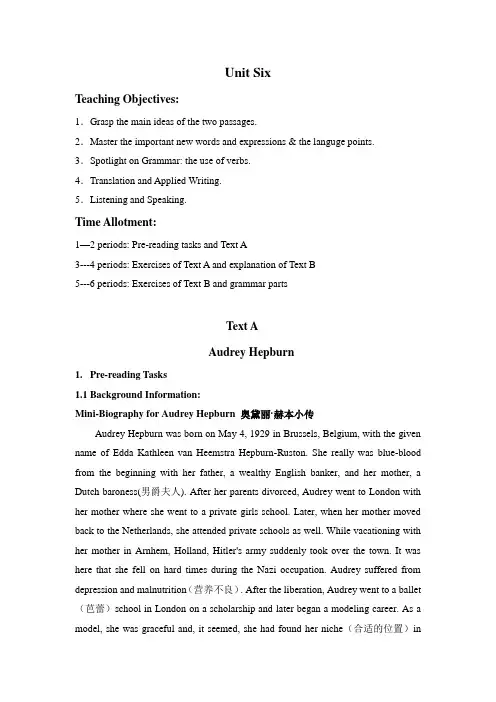
Unit SixTeaching Objectives:1.Grasp the main ideas of the two passages.2.Master the important new words and expressions & the languge points. 3.Spotlight on Grammar: the use of verbs.4.Translation and Applied Writing.5.Listening and Speaking.Time Allotment:1—2 periods: Pre-reading tasks and Text A3---4 periods: Exercises of Text A and explanation of Text B5---6 periods: Exercises of Text B and grammar partsText AAudrey Hepburn1.Pre-reading Tasks1.1Background Information:Mini-Biography for Audrey Hepburn 奥黛丽·赫本小传Audrey Hepburn was born on May 4, 1929 in Brussels, Belgium, with the given name of Edda Kathleen van Heemstra Hepburn-Ruston. She really was blue-blood from the beginning with her father, a wealthy English banker, and her mother, a Dutch baroness(男爵夫人). After her parents divorced, Audrey went to London with her mother where she went to a private girls school. Later, when her mother moved back to the Netherlands, she attended private schools as well. While vacationing with her mother in Arnhem, Holland, Hitler's army suddenly took over the town. It was here that she fell on hard times during the Nazi occupation. Audrey suffered from depression and malnutrition(营养不良). After the liberation, Audrey went to a ballet (芭蕾)school in London on a scholarship and later began a modeling career. As a model, she was graceful and, it seemed, she had found her niche(合适的位置)inlife---until the film producers came calling. After being spotted modeling by a producer, she was signed to a bit part in the European film Nederlands in 7 lessen in 1948. Later, she had a speaking role in the 1951 film, Young Wives' Tale,as Eve Lester. The part still wasn't much, so she headed to America to try her luck there.blue-blood:贵族(或王族,名门)出身;贵族,王族,名门望族。
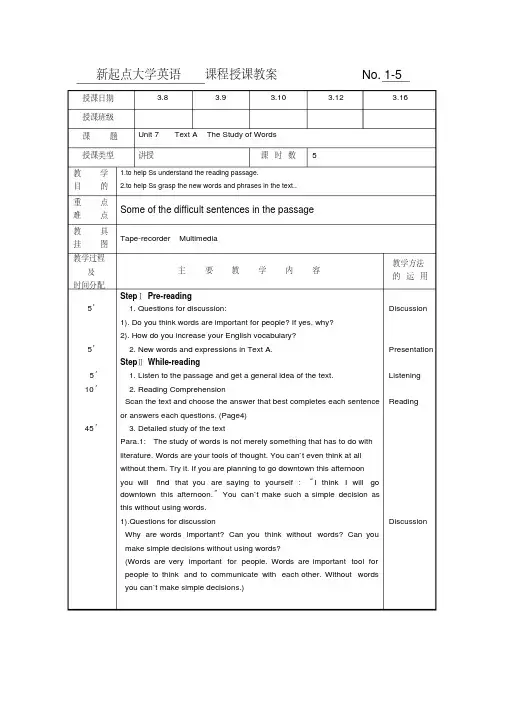
新起点大学英语课程授课教案No. 1-5 授课日期 3.8 3.9 3.10 3.12 3.16 授课班级课题Unit 7 Text A The Study of Words授课类型讲授课时数 5教学目的1.to help Ss understand the reading passage.2.to help Ss grasp the new words and phrases in the text..重点难点Some of the difficult sentences in the passage 教具挂图Tape-recorder Multimedia教学过程及时间分配主要教学内容教学方法的运用5’5’5’10’45’StepⅠ Pre-reading1. Questions for discussion:1). Do you think words are important for people? If yes, why?2). How do you increase your English vocabulary?2. New words and expressions in Text A.StepⅡ While-reading1. Listen to the passage and get a general idea of the text.2. Reading ComprehensionScan the text and choose the answer that best completes each sentenceor answers each questions. (Page4)3. Detailed study of the textPara.1:The study of words is not merely something that has to do withliterature. Words are your tools of thought. You can`t even think at allwithout them. Try it. If you are planning to go downtown this afternoonyou will find that you are saying to yourself : “I think I will godowntown this afternoon.”You can`t make such a simple decision asthis without using words.1).Questions for discussionWhy are words important? Can you think without words? Can youmake simple decisions without using words?(Words are very important for people. Words are important tool forpeople to think and to communicate with each other. Without wordsyou can`t make simple decisions.)DiscussionPresentationListeningReadingDiscussion。
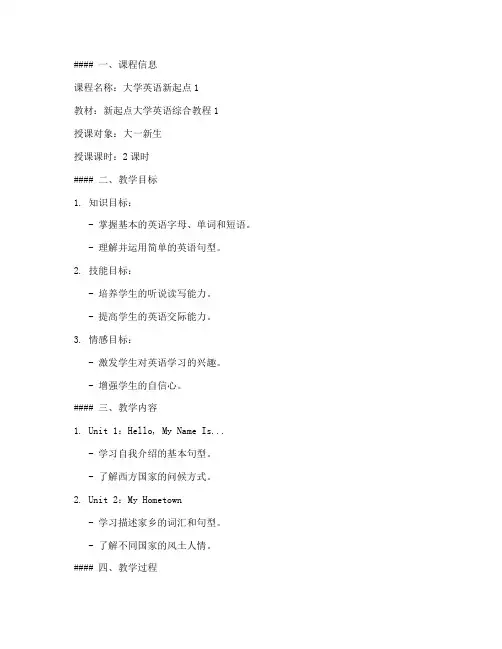
#### 一、课程信息课程名称:大学英语新起点1教材:新起点大学英语综合教程1授课对象:大一新生授课课时:2课时#### 二、教学目标1. 知识目标:- 掌握基本的英语字母、单词和短语。
- 理解并运用简单的英语句型。
2. 技能目标:- 培养学生的听说读写能力。
- 提高学生的英语交际能力。
3. 情感目标:- 激发学生对英语学习的兴趣。
- 增强学生的自信心。
#### 三、教学内容1. Unit 1:Hello, My Name Is...- 学习自我介绍的基本句型。
- 了解西方国家的问候方式。
2. Unit 2:My Hometown- 学习描述家乡的词汇和句型。
- 了解不同国家的风土人情。
#### 四、教学过程##### 第一课时(一)导入新课1. 课堂问候:教师用英语问候学生,营造轻松的学习氛围。
2. 热身活动:学生用英语进行简单的自我介绍,教师给予反馈。
(二)讲授新课1. 词汇教学:- 介绍本课的生词,如:name, hometown, introduce, interesting, famous 等。
- 通过图片、例句等方式帮助学生记忆单词。
2. 句型教学:- 讲解本课的句型,如:Hello, my name is...;My hometown is...;It's interesting/famous...- 通过角色扮演等方式让学生练习句型。
(三)巩固练习1. 听力练习:播放与本课内容相关的听力材料,让学生回答问题。
2. 口语练习:学生分组进行对话练习,描述自己的家乡。
(四)小结1. 回顾本课所学内容。
2. 强调重点词汇和句型。
##### 第二课时(一)复习导入1. 回顾上一节课所学内容。
2. 学生用英语描述自己的家乡。
(二)讲授新课1. 词汇教学:- 介绍本课的生词,如:weather, family, school, study等。
- 通过图片、例句等方式帮助学生记忆单词。
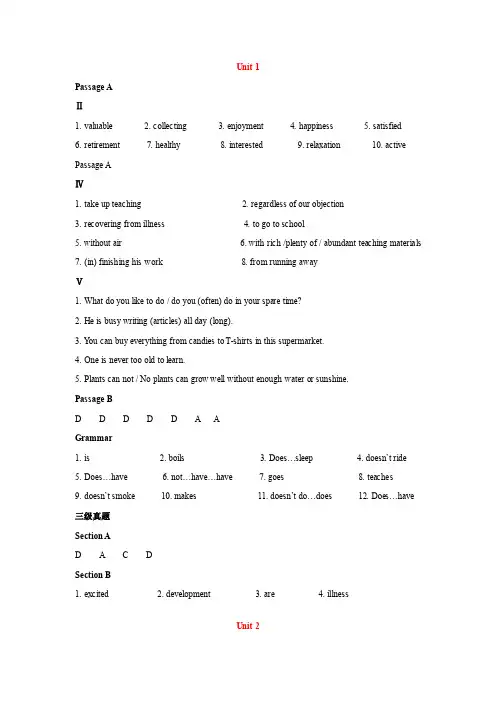
Unit 1Passage AⅡ1. valuable2. collecting3. enjoyment4. happiness5. satisfied6. retirement7. healthy8. interested9. relaxation 10. active Passage AⅣ1. take up teaching2. regardless of our objection3. recovering from illness4. to go to school5. without air6. with rich /plenty of / abundant teaching materials7. (in) finishing his work8. from running awayⅤ1. What do you like to do / do you (often) do in your spare time?2. He is busy writing (articles) all day (long).3. Y ou can buy everything from candies to T-shirts in this supermarket.4. One is never too old to learn.5. Plants can not / No plants can grow well without enough water or sunshine.Passage BD D D D D A AGrammar1. is2. boils3. Does…sleep4. doesn’t ride5. Does…have6. not…have…have7. goes8. teache s9. doesn’t smoke 10. makes 11. doesn’t do…does 12. Does…have 三级真题Section AD A C DSection B1. excited2. development3. are4. illnessUnit 2Passage AII1. staying2.being improved /improving /improved3.effective4.pleasantly.5. patience .6.advice7.participants8.secondary9.punctually(['pʌŋktjuəl ['pʌŋktʃuəl])10.gratefullyIII.Course1. 这项工作将在本周内完成。
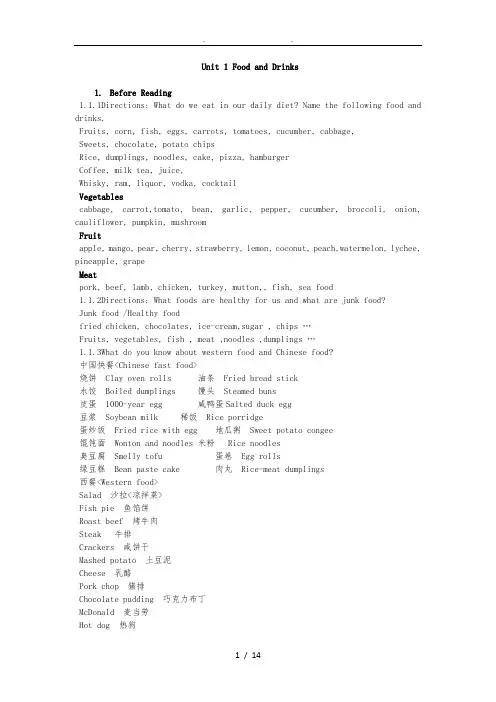
Unit 1 Food and Drinks1.Before Reading1.1.1Directions: What do we eat in our daily diet? Name the following food and drinks.Fruits, corn, fish, eggs, carrots, tomatoes, cucumber, cabbage,Sweets, chocolate, potato chipsRice, dumplings, noodles, cake, pizza, hamburgerCoffee, milk tea, juice,Whisky, ram, liquor, vodka, cocktailVegetablescabbage, carrot,tomato, bean, garlic, pepper, cucumber, broccoli, onion, cauliflower, pumpkin, mushroomFruitapple, mango, pear, cherry, strawberry, lemon, coconut, peach,watermelon, lychee, pineapple, grapeMeatpork, beef, lamb, chicken, turkey, mutton,, fish, sea food1.1.2Directions: What foods are healthy for us and what are junk food?Junk food /Healthy foodfried chicken, chocolates, ice-cream,sugar , chip s …Fruits, vegetables, fish , meat ,noodles ,dumplings …1.1.3What do you know about western food and Chinese food?中国快餐<Chinese fast food>烧饼 Clay oven rolls 油条 Fried bread stick水饺 Boiled dumplings 馒头 Steamed buns皮蛋 1000-year egg 咸鸭蛋Salted duck egg豆浆 Soybean milk 稀饭 Rice porridge蛋炒饭 Fried rice with egg 地瓜粥 Sweet potato congee馄饨面 Wonton and noodles 米粉 Rice noodles臭豆腐 Smelly tofu 蛋卷 Egg rolls绿豆糕 Bean paste cake 肉丸 Rice-meat dumplings西餐<Western food>Salad 沙拉<凉拌菜>Fish pie 鱼馅饼Roast beef 烤牛肉Steak 牛排Crackers 咸饼干Mashed potato 土豆泥Cheese 乳酪Pork chop 猪排Chocolate pudding 巧克力布丁McDonald 麦当劳Hot dog 热狗Pizza 比萨<意大利烘馅饼>Sandwich XX治Sausage 香肠Ketchup 番茄酱Doughnut 面包圈Hamburger 汉堡包Milk shake 奶昔1.1.4Game TimeDivide the students into groups of five. Give the first student a word about food, let him/her try to remember it and spell it secretly to the next one. If the fifth student spell the word correctly, then the team gets One score. The team that scores Ten first will win.mushroom 蘑菇asparagus 芦笋broccoli 椰菜, 花茎甘蓝lettuce 莴苣celery 芹菜cauliflower 花菜cherry 樱桃garlic 蒜ginger root 姜tangerine 橘子pomegranate 石榴chilli pepper 尖椒persimmon 柿子1.2 Video-watching1.2.1. What are the rats doing in the kitchen?1.2.2. What does the dish remind the long-facedcritic of?1.2.3. Do you believe that everyone can become a cook?2.Global Reading2.1Directions: Scan the text and answer the following questions.1. How do you understand fast food?2. What is the key to success of the fast food chains?3. What factors influence people’s dieting preferences?4. What is the purpose of the extensive research conducted by fast food companies?5. In paragraph 4, what does "side order" mean?6. What is Thailand’s f avorite fast food?7. In India, why are the beef and pork not eaten?8. What do burger chains offer in the United States?9. What is the situation of dining out in Russia before the chain restaurants opened?10. Can you list some local favorites in your hometown?2.2 Text StructurePart DivisionMain IdeasI1—2 Fast food chains are successful and their key to success istailoring menus to suit different tastes and cultures.II3—10Fast food restaurant McDonald’s embraces the differentpreferences and designs different menus to offer local favorites indifferent countries.Ⅲ11Fast food restaurants are ready and willing to sell people anything they desire to eat.Paragraph Pattern – From general to specific3.Detailed Reading3.1 Background Information3.1.1France: goose liver, cheese, wineIndia: braised beef with curry, roti prata,tea with milkFOOD LIKES:Food---- KFC; braised beef with curry<咖喱牛肉饭>; cheese;hamburger; roti prata <抛饼>; goose liverDrinks---- tea with milk ; wine; cola.3.1.2 Specials in Different CountriesFood TabooAt an informal meal, the table setting is not cluttered and all the flatware is laid on the table at one time. At the host's option the dessert utensils may be brought to the table on the dessert plate.To avoid cutter, the general rule for a any table setting is to include no more than three utensils on either side of the dinner plate at a time. The exception is the oyster <or seafood> fork, which may be placed to the right of the last spoon even when it is the fourth utensil to the right of the plate. The initial table setting for a typical formal dinner should look something like this:Alcoholics Anonymous <AA> is an international mutual aid movement which says its "primary purpose is to stay sober and help other alcoholics achieve sobriety" founded in 1935 by Bill Wilson and Dr. Bob Smith <Bill W. and Dr. Bob> in Akron, Ohio.3.1.3Fast Food with Global MenuDonna O’MearaDo you want fries with that? Just what is "that"? It depends on where you are in the world. Some of the most successful global businesses on the planet are fast food chains. Their key to success is tailoring menus to suit different tastes and cultures.People around the world have very different preferences in food, and their diets are influenced by geography, local customs and religious restrictions. Some cultures avoid certain foods, or they will eat things you wouldn’t. Fast food restaurantshave embraced these differences. For example, McDon ald’s may not offer the same menu to Russian customers that it does to Japanese customers, but people in both countries receive a meal packaged in paper printed with the company’s identifiable "M".Fast food companies conduct extensive research to tailor menus for regional differences. So, in the busy city of Dubai, United Arab Emirates, where people’s diets are influenced by their Muslim beliefs, McDonald’s serves up the McArabia burger. With grilled minced meat combined with onions and Arabian spices, the burger is based on a traditional favorite Muslim dinner.And what do hamburger restaurants serve in countries like Japan, where people prefer to eat fish, sushi, and rice? It’s simple: they offer a hot fried shrimp burger with a side order of steamed rice instead of French fries.Burger chains offer local favorites throughout Asia. Korean burgers are pork patties cooked in a traditional Korean barbecue garlic sauce. Taiwanese diners favor spicy chicken drumstick sandwiches, in line with their tastes for spicy food and dark meat. Thailand’s favorite fast food is a spicy pork burger and a green tea pie dessert. Children in Spain order tapas, a lot of small bites of local food favorites, at their local burger restaurant.Australia and New Zealand restaurants reflect local food preferences by adding egg, bacon, beet root, and cheese to burgers.In India, cows are considered sacred and are never killed. Beef and pork are not eaten as this would be a serious offence to Hindu beliefs. Burger sellers faced a huge challenge in designing menus for Indians. A local Indian favorite is the Chicken McCurry Pan, a blend of tomato sauce, mixed with chicken, baked, and served on spiced bread and topped with cheese.Canadian fast food chains serve something that looks like a traditional Canadian dish consisting of French fries covered in cheese curds and gravy. The favorite in El Salvadoran burger chains, is filled with meat and cheese. Argentineans favor steak sandwiches based on a local herbed sauce.Burger chains in the United States offer local favorites, too. In New Mexico, you can get peppers on your sandwich; breakfast burritos are served throughout the Southwest; and pineapple-topped burgers are offered in Hawaii.Before chain restaurants opened in Russia, dining out was limited and not always a pleasant experience. Waiters were usually rude to many customers. So when more than 125 fast food burger restaurants opened across Russia, a record of 30,000 Russians rushed to the openings, lined up, and waited for hours to buy hamburgers and French fries, all because they were served happily with a smile and a thank-you. Russian people found this to be a delightful experience and made the Russian fast food hamburger business the fifth largest market in all of Europe.The list of local favorites around the world is endless. One thing is for sure: People like to eat, and fast food restaurants are ready and willing to sell them anything they desire. So, if being a restaurant entrepreneur is your dream, you’d better start planning your global menu now.3.3 Useful Expression1. depend on v.1> 取决于2> 依赖,依靠All living things depend on the sun for their growth.万物生长靠太阳。
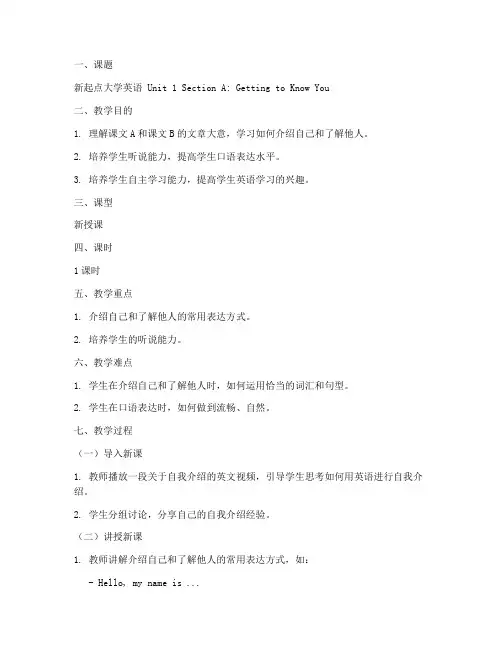
一、课题新起点大学英语 Unit 1 Section A: Getting to Know You二、教学目的1. 理解课文A和课文B的文章大意,学习如何介绍自己和了解他人。
2. 培养学生听说能力,提高学生口语表达水平。
3. 培养学生自主学习能力,提高学生英语学习的兴趣。
三、课型新授课四、课时1课时五、教学重点1. 介绍自己和了解他人的常用表达方式。
2. 培养学生的听说能力。
六、教学难点1. 学生在介绍自己和了解他人时,如何运用恰当的词汇和句型。
2. 学生在口语表达时,如何做到流畅、自然。
七、教学过程(一)导入新课1. 教师播放一段关于自我介绍的英文视频,引导学生思考如何用英语进行自我介绍。
2. 学生分组讨论,分享自己的自我介绍经验。
(二)讲授新课1. 教师讲解介绍自己和了解他人的常用表达方式,如:- Hello, my name is ...- I come from ...- I'm a student at ...- I'm interested in ...- What about you?- I'm from ...- I study ...- I like ...2. 教师引导学生进行角色扮演,模拟介绍自己和了解他人的场景。
(三)巩固练习1. 学生分组进行自我介绍,其他同学提问,了解对方的个人信息。
2. 教师组织学生进行小组讨论,分享自己学到的介绍自己和了解他人的表达方式。
(四)归纳小结1. 教师总结本节课的重点内容,强调介绍自己和了解他人的常用表达方式。
2. 学生分享自己的学习心得,总结自己在本节课中的收获。
(五)作业布置1. 学生课后练习自我介绍,并用英语写一篇关于自己的短文。
2. 学生预习下一节课的内容,为下一节课做好充分准备。
八、板书设计1. 介绍自己和了解他人的常用表达方式2. 学生自我介绍示例3. 小组讨论成果展示九、教具1. 投影仪2. 白板3. 录音笔4. 学生自我介绍视频通过本节课的学习,学生能够掌握介绍自己和了解他人的常用表达方式,提高口语表达能力,为今后的英语学习打下坚实基础。

astonishing adj .令人惊讶的normal adj.正常common adj.共同的differ from 与……不同wine n n.葡萄酒、红酒raw adj.生的,未熟的topic n.主题habit n.习惯distinctive adj.有特色的,与众不同的spicy adj.辛辣的cuisine n.烹饪法chili n.辣椒pungent adj.辛辣的,刺鼻的approximately adv.大约tender adj.软的,嫩的impress v.留下印象ingredient n.成分、配料oyster n.sauce n.调味汁、酱汁border v.毗邻confucius n.孔子critical adj.挑剔的renowned adj.著名的,有望的aroma n.香味principle n.原则、准则tang Dynasty n.唐朝celebrity n.名人,名流dominate v.控制、操作a portion of 一部分starve v.使挨饿、饿死worship v.仰慕、崇拜ridiculous adj.可笑的superficial adj.表面的、肤浅的immune adj.免疫的、有免疫的figure n. 体型、身材skew v.使歪曲、歪曲frequent adj.经常的essential adj.必要的exterior n.外貌、外表lipstick n.口红、唇膏attraction n.吸引力lip n.嘴唇harsh adj.严厉的cosmetic n.化妆品dye v.染色sandalwood n.檀香木parisian n.巴黎人perfumery n.香水商店、香水制造厂sausage n.香肠accidentally adv.偶然地shade n.颜色的深浅度、色调keep track of 效仿manufacture n.制造wax n.蜡conventional adj.传统的long-lasting 长久的variety n.多样化modern adj.现代的enormous adj.大的、巨大的cottage n.村舍high-rise n.高楼own v.拥有occupy v. 占用rent v租用、租借council house 公屋private adj.私有人、私有的lane n.车道、小巷old-fashioned adj.过时的appreciate v赞赏、了解ancient adj.古代的、远古的culture n.文化folklore n.民俗学、民间传说major adj.较重要的、较严重的dweller n.居住者、居民hospitable adj.殷勤待客的、好客的maintain v保持、维持community n.社区、社团originally adv.本来、最初modernize v使现代化Engrave v雕刻couplet n.对句、对联concentrate v集中、使集中于(某处)attach v 附有、带有interview n.面试applicant n.申请书lndispensable adj.必要的occasion n.情形personality n.个性、个性的特征credibility n.可信度、可信性firm n.公司secure v.得到courteous adj.有礼貌的aptitude n.能力confidently adv.自信地ensure v.确保、确信quality n.品质rule out 排除live adj.精力充沛的attraction adj.吸引人的ugly adj.丑陋over-excitable adj.过分激动的dull adj.无趣的undesirable adj.不受欢迎的essential adj.重要的capacity n. 能力sympathy n.同情tolerant adj.宽容的lnduce v.引诱technique n.技巧demand v.要求vivid adj.生动的patience n. 耐性perfect adj.完美的method n.方法by far 到目前为止every now and then 时而lush adj.清脆的harmonious adj.和谐的intimate adj.亲密的core embodiment of the Olympic spirit奥林匹克精神的核心体现inviting adj.动人的fiery adj.热烈的mural n.壁画excel v.优秀的antelope n.羚羊agile adj.敏捷的stretch n.一段路程commitment to 对……承诺incorporate v.合并、体现ethnic adj.种族的、民族的track and field event 田间项目infinite adj.无限大gymnastics n.体操risky adj.危险的elastic adj.有弹力的、有弹性的ankle n.脚踝cliff n.悬崖psychologist n.心理学家continuous adj.连续的survival n.生存comparatively adv.相对的organize v.组织、管理professional adj.专业的athlete n.运动员advertise v.宣传、为……做广告advertisement n.广告、宣传photograph n.照片whistle v.吹口哨、吹哨子warning n.警告、提醒territory n.领土、动物的领地male adj.男性claim v.声称(某物)为自己所有threaten v.威胁、扬言frighten away 把(某人)吓跑scare v.恐吓、使惊恐nest v.筑巢、巢居scream v.尖声喊叫、惊呼attract v.吸引set up 建立、创立、竖立lay down 放下、交出get over 克服cunning adj.奸诈的、狡猾的poison n.毒药、毒物find v.了解、发现shy adj.害羞的、腼腆的hole n.洞、孔path n.小路、小径rock n.岩石keep away from 不接近、(使)避开get used to 习惯于at a time 一次stay n.住、停留settle down v.安定下来improve v.提高effective adj.有效的Hobby n.业余爱好hobbyist n.业余爱好者perform v.表演butterfly n.蝴蝶take up 从事offer v.提供relaxation n.轻松、放松relax v.轻松、放松yield v.产出financial adj.金融的、财政的provide v.提供、供给retire v.退休、退职regardless of 不管、不顾recover from 从…康复、痊愈bedridden adj.卧床不起的pastime n.消遣、娱乐leisure n.空闲、闲暇prosperity n.繁荣surplus n.盈余measure n.量、程度ornamental adj.装饰性的Friendly n.友好的人Blessing n.祝福Naivety n.天真烂漫Pose n.姿态doer v.喜爱lotus n.荷花headdress n.头饰inspire v.得到灵感porcelain n.瓷器course n.课程patient adj.耐心的intensive adj.加强的fellow student n.同学participate v.参加mention v.提到、提及advise v. 建议surroundings n.环境tiring adj.令人疲倦的punctually adv.准时地bookmarker n.书签librarian n.图书管理员do-it-yourself adj.自己做的be grateful to sb 对…感激relationship n. 关系curious adj.好奇的typical adj.经典的get along with 相处weekly adj.每周的schedule n.日程表major n.专业attend v.参加lecture n.演讲introduction n. 介绍sociology n.社会学economics n.经济学take notes 做笔记information n.信息section n.部分graduate student 研究生assistant n.助手direct v.指导laboratory n.实验室subject n.科目literature n.文学instant adj.立刻的、即刻的blast n.爆炸explode v.使爆炸architect n,建筑师、设计师executive n.主管、(公司的)行政人员scream v.尖叫、惊呼formal adj.正式的instruct v.指导assure v.使…确信caution n.警告doom v.注定死亡strand v.使…留在indecision n.犹豫describe v.描述respectable adj.体面的、值得尊敬的intelligent adj.聪明的professional adj.职业的convict v.控告end up 以……告终admit v.承认prosecute v.起诉theft n.偷defend v.(为被告)当辩护律师ashamed adj.羞愧的embarrassed adj.尴尬的criminal n.犯罪system n.系统、体系institution n.公共机构figure n.数字electric adj.电子的factor n.因素purpose n.目的edit v.编辑transportation n.交通predict v.预测defense n.防御decrease v.降低influence v.影响countless adj.无数的、数不清的spot n.点、斑点infect v.传染virus n.病毒intelligence n.智力function n.作用spread v.传播suffer v.遭受痛苦、受损失desire n.愿望draw near v.临近fade v.减退rage n.流动之物vi.发怒detail n.细节select v.选择、挑选disappointment n.失望trade in for sth 用…折价换新的…clay n.泥土model n.模型real adj.真的pick out 选出painstakingly adv.费心地tiny adj.小的、极小的heart-shaped adj.心形的package n.包裹beam v.微笑withdraw v.撤退、撤离single adj.唯一的、单一的powerless adj.无能力的、无影响力的adviser n.顾问introduce v.介绍choke up 哽咽pour out 倾吐、倾诉marked adj.显明的、明显的improvement n.改进、改善watercolor n.水彩、水彩画medium n.媒介、媒体date back 追quality n.质量fresco n.壁画pigment n.颜料plaster n.灰泥preliminary adj.预备的sketch n.素描、草图subdue v.使(颜色或光线)柔和attraction n.吸引力popularity n.流行、普及achievement n.成就、成绩stricken adj.受困扰的polio n.麻痹症brace n.支撑物crutch n.丁字形支撑物awesome adj.令人敬畏的majestically adv.庄重地clasp n.扣子、夹子tuck v.把…藏到proceed v.继续做audience n.观众ritual n.程序、例行公事reverent adj.恭敬的snap v.啪地绷端go off 发生limp v.破行signal v.发信号orchestra n.管弦乐队leave off 中断、停止passion n.热情、激情purity n.纯正、纯洁symphonic adj.交响乐的、调和的modulate v.调节、调整compose v.谱写、写作applause n.鼓掌auditorium n.听众席、观众席appreciate v.欣赏、感激bewildering adj.令人困惑的boastful adj.自夸的、思考的definition n.定义sacred adj.神圣的irritating adj.使人愤怒的concentrate v.集中communicate v.交流permanent adj.永久的urban adj.城市的countryside n.农村、乡间dweller n.居民rural adj.农村的、田园的construction n.建筑tram n.有轨电车major adj.主要的elevate v.提高、提升flyover n.立交桥congested adj.拥挤的zone n.地区、地带density n.密集、密度residential adj.住宅的bad-tempered adj.生气的、脾气坏的nervous adj.紧张的bring about 引起、产生oxygen n.氧气chemical n.化学品poison v.给…服毒药do harm to 对…有害atmosphere n.大气folk adj.民间的reflect v.反映、表达exaggerate v.夸张workmanship n.手艺、工艺pattern n.图案、模式frame v.给…镶框paste v.粘贴traditional adj.传统的scissors n.剪刀engrave v.雕刻scare away 将…吓跑custom n.习俗represent v.代表sacrifice n.奉献、献祭primitive adj.原始的recede v.退后、远去clan n.宗族bring out 拿出去bounty n.慷慨、施舍ancestor n.祖先sumptuous adj.豪华的、heartily adv. 热心地disintegration n.分裂、分化content n.内容farewell n.告辞lunar adj.月亮的calendar n.日历keep off 远离、离开monster n.怪物legend n.传说origin n.起源fierce adj.凶猛的ferocious adj.残忍的、凶猛的figure out 计算出crackle v.发噼啪声firecracker n.鞭炮crescent n.新月symbolize v.象征longevity n.长寿convey v.传送、传达reunion n.团聚、重聚ceremony n.仪式show off 表现、展现status n.状况、地位exchange n.交换constant adj.忠诚的、忠实的intense adj.强烈的、剧烈的generous adj.慷慨的、大方的fade away 逐渐变弱circumstance n.情形、情况by chance 偶然地、意外地leave off 停止做、放弃做delighted adj.高兴的take on 承担、从事obligation n.责任、义务hesitate v.犹豫hospitality n.好客、殷勤entertain v.招待neglect v. 忽略、忽视delivery n.投递、传递cancel v.取消touch n.做事的方式vary v.(使)变化、不同token 象征numerous adj.许多的achieve v.完成、实现casual adj.诚意的、非正式的inappropriate adj.不恰当的、不准确的acquaintance n.相识wrap v. 包admire v.钦佩、赞赏comment n.评价、评论decoration n.装饰furniture n.家具compliment n.赞赏autonomous adj.自治的drizzle v.下毛毛雨conspicuous adj.明显的、显著的guard n.警卫cashier n.出纳员experience n.经历encounter v.遇到、不期而遇hostility n故意、敌意unexpectedly adv.意料之外地spacious adj.宽敞的via prep.经由、经过ideal adj.理想的lazy adj.懒惰的daily adj.日常的doubt n.怀疑voyage n.航空、航海comfortable adj.舒适的lemonade n.汽水、鲜柠檬水sweat v.出汗、冒汗swimming bath n.室内公共游泳池cabin n.小屋variety n.多样化amusement n.乐趣、娱乐活动in return 作为对…的报答pleasure n.高兴、愉快、满足ashore adv.在(向)岸上、在(向)陆上mysterious adj.神秘的、那一理解的。
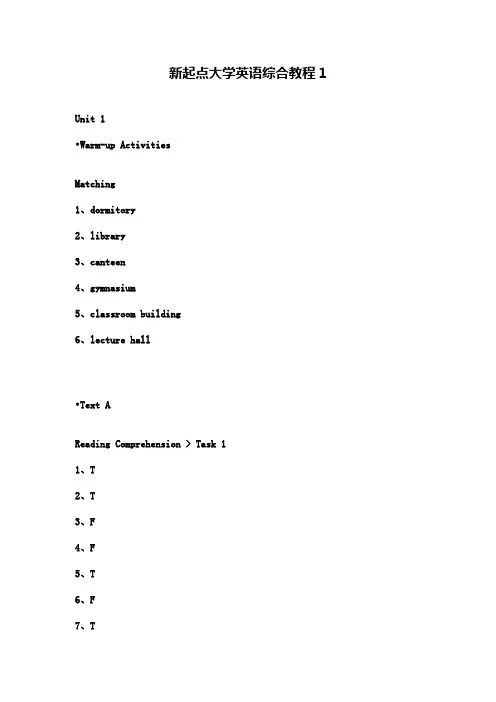
新起点大学英语综合教程1 Unit 1•Warm-up ActivitiesMatching1、dormitory2、library3、canteen4、gymnasium5、classroom building6、lecture hall•Text AReading Comprehension > Task 11、T2、T3、F4、F5、T6、F7、TReading Comprehension > Task 21、examsscholarships2、remain a cherished memory3、surprisedhave in common4、how incredible your parents really are5、full, exciting, challenge-laden, and stressful fun and unforgettableVocabulary & Structure > Task 11、c2、j3、g4、a5、i6、e7、d8、f9、b10、hVocabulary & Structure > Task 21、genuine2、cherished3、explore4、incredible5、survived6、voluntarily7、consequences8、expand9、energetically10、leisureVocabulary & Structure > Task 3 1、survivedsurvival2、energeticallyenergetic3、voluntarilyvolunteer4、cherishcherished5、societysocialVocabulary & Structure > Task 41、unequal2、informal3、unable4、incapable5、uncomfortableVocabulary & Structure > Task 51、B2、C3、B4、D5、AVocabulary & Structure > Task 61、……你正躺在下铺,毫无压力。
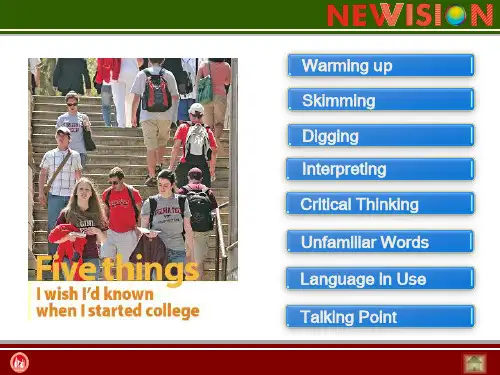
一、课题《新起点大学英语1》第1单元二、教学目的1. 培养学生掌握基本的英语听说读写能力。
2. 使学生了解英语国家的基本文化背景。
3. 提高学生的英语学习兴趣,培养良好的学习习惯。
三、课型新授课四、课时2课时五、教学重点1. 基本词汇的掌握。
2. 基本句型的运用。
3. 基本语法知识的运用。
六、教学难点1. 词汇的记忆与运用。
2. 语法知识的灵活运用。
七、教学过程(一)导入新课1. 利用图片、视频等方式,激发学生的学习兴趣。
2. 通过简短的英语对话,引导学生复习已学知识,为新课做好铺垫。
(二)讲授新课1. 词汇讲解:讲解本单元重点词汇,并举例说明其在句子中的运用。
2. 句型讲解:讲解本单元重点句型,并引导学生进行模仿练习。
3. 语法讲解:讲解本单元重点语法知识,并结合例句进行讲解。
(三)巩固练习1. 词汇练习:通过填空、选择题等形式,巩固学生对本单元词汇的掌握。
2. 句型练习:通过仿写、改写等形式,提高学生对本单元句型的运用能力。
3. 语法练习:通过判断题、改错题等形式,巩固学生对本单元语法知识的运用。
(四)归纳小结1. 总结本单元所学内容,强调重点、难点。
2. 鼓励学生课后复习,巩固所学知识。
(五)作业布置1. 复习本单元所学词汇、句型和语法知识。
2. 完成课后练习题,提高自己的英语能力。
八、板书设计一、词汇1. basic2. important3. language4. communication5. skill二、句型1. This is a book.2. I have a pen.3. She is a teacher.三、语法1. be动词2. have/has3. 主谓一致九、教具1. 电脑、投影仪2. 课本、练习册3. 图片、视频通过本节课的学习,学生应掌握本单元的基本词汇、句型和语法知识,并能运用所学知识进行简单的英语交流。
同时,培养学生良好的学习习惯,提高英语学习兴趣。
新起点大学英语综合教程
《新起点大学英语综合教程》是一套专门针对大学生的英语教材。
本教材旨在提高大学生的英语综合应用能力,包括听、说、读、写、译等方面的训练。
教材以实用英语为主线,内容涵盖了各个层次的词汇、语法、阅读、写作和听力。
教材的特色之一是注重培养学生的实际应用能力,突出了语言运用和交际能力的训练。
通过丰富的听力练习、口语训练和写作任务,学生能够更好地掌握英语语言的表达能力。
教材的另一个特点是紧密结合时事热点和实际生活中的场景。
每个单元的课文都选取了与当下社会热门话题相关的文章,以激发学生的学习兴趣和思考能力。
同时,教材还设置了相关的词汇和语法练习,以帮助学生更好地理解文章内容,提高语言水平。
除了课文训练,教材还提供了大量的听力材料和练习题。
通过听力材料的训练,学生可以提高自己的听力理解和听写能力。
同时,练习题也为学生提供了机会,使他们能够更好地应用所学知识。
同时,教材还提供了一些实用的学习建议和技巧,帮助学生更好地制定学习计划和提高学习效果。
总之,《新起点大学英语综合教程》是一本旨在提高大学生英语综合应用能力的教材。
通过实用的英语训练和与时俱进的课文选材,教材帮助学生提高了英语听说读写等各个方面的能力,使他们能够更好地应对英语学习和日常交流中的挑战。
新起点大学英语综合教程21. 简介《新起点大学英语综合教程2》是一本适用于大学英语学习者的综合教材。
本教程旨在帮助学生提高英语听说读写的能力,并且扩大词汇量,提高语法理解能力。
教程内容涵盖了各个语言技能,并通过多样的练习和活动进行巩固。
2. 教材结构《新起点大学英语综合教程2》共分为十个单元,每个单元包含以下内容:2.1 课文每个单元都有一篇原版英语课文,这些课文涵盖了各种主题和语言要点。
课文难度适中,适合大学英语学习者使用。
2.2 词汇与语法每个单元的课文后面都有相关的词汇和语法练习。
这些练习旨在帮助学生巩固词汇和语法知识,并加深对课文的理解。
2.3 阅读与听力每个单元的阅读和听力材料都与课文内容相关,旨在帮助学生提高阅读和听力技能。
这些材料包括理解文章主旨、细节理解、词汇理解等题型。
2.4 口语和写作教材中还包括口语和写作练习,通过对话和写作题目帮助学生提高口语和写作能力。
这些练习让学生有机会运用所学的语言知识进行实践。
2.5 附录《新起点大学英语综合教程2》的附录部分包含了各个单元的词汇表、语法解释和参考答案。
学生可以通过查阅附录来提高对学习内容的理解和掌握。
3. 使用方法《新起点大学英语综合教程2》可以作为课堂教学教材,也可以作为自主学习的辅助教材。
对于课堂教学,教师可以根据教材中的教学指导来进行教学安排,包括理解课文、进行练习、展开讨论等。
教师还可以根据学生的实际情况进行适当的延伸活动和辅导。
对于自主学习,学生可以按照教材的结构和顺序进行学习。
每个单元可以分配一定的时间来完成相关的练习和活动。
学生还可以借助附录中的参考答案来自我检测和提高。
4. 学习目标《新起点大学英语综合教程2》的学习目标包括以下几个方面:•提高听力理解和口语表达能力•扩大英语词汇量并提高词汇运用能力•理解并运用基本的语法规则•提高阅读理解和写作能力•培养学生的学习策略和自主学习能力5. 结语《新起点大学英语综合教程2》是一本全面的大学英语综合教材,旨在帮助学生提高英语综合运用能力。
Unit FourTeaching Objectives:1. Grasp the main idea of Text A —Using chopsticks can help to improve therelations between the two countries.2. Grasp the main idea of Text B — People from different places in the U.S.A.can act as bridges crossing huge oceans tojoin separate cultures.3. Master important language points and grammatical points.4. Learn how to write Congratulation Cards and how to use punctuations.Time Allotment:1~2 periods: Pre-reading tasks and Text A3~4 periods: Exercises of Text A and new words of Text B5~6 periods: Exercises of Text B and grammar parts.Text AUS Presidents and Chinese Chopsticks1. Pre-reading Tasks1.1. Background Information --- Richard NixonRichard Milhous Nixon is one of the most fascinating political figures of the 20th Century. Nixon's political career began in 1947 when he was elected to the House of Representatives, after campaigning strongly as an anti-communist. By 1952, he had moved to the Senate and was chosen by Dwight Eisenhower to be his running mate in the presidential election. By 1968 he was on his way back, winning the Republican Party nomination, defeating Democrat Hubert Humphrey and becoming the 37th President on January 20, 1969. Nixon was re-elected in a landslide in 1972, defeating Senator George McGovern, and was sworn in for a second term on January 20, 1973.A few days later, he announced an agreement to end the Vietnam War. However, by the beginning of 1973, the Watergate scandal was unfolding and the next eighteen months were dominated by damaging revelations and a legal fight between the Executive arm of government versus the Congress and the Supreme Court. Following his resignation, Nixon devoted himself to rehabilitating his public reputation. He wrote a number of books and travelled widely. Nixon died in 1994. His funeral was held on April 27 at the Richard Nixon Library and Birthplace, Yorba Linda, California.1.2. Pre-reading questions1) What is the most important tool in eating Chinese food?Chopsticks.2) Are there any other tools/ utensils which will be used in eating Chinese food? Fork and spoon.3) Do you think it is difficult for someone to learn to use chopsticks?Yes, esp. for westerners, because they are not accustomed to using such a tool in eating. In eating western food they use fork and knife.4) Do you think that chopsticks can play a role in China-US relations?1.3. Skim the text once and try to answer the following question.1) What is the main idea of Text A?Using chopsticks is not only a part of the Chinese culture but also a kind of political art. U.S. Presidents try to improve the relations between the two countries by showing off the skills of using chopsticks.2. While Reading Tasks2.1. Read the new words twice loudly and correctly.2.2. Scan the text once and try to answer the following questions.1) Who was the first president to visit China in the 1970s?Richard Nixon.2) What is an important lesson for all of the presidents when they visited China?Learning to use chopsticks.3) Why did they have to learn to use chopsticks?Because it is not only a part of the Chinese culture but also a political art.4)Why could Mr. and Mrs. Nixon use the chopsticks well?Because they had practiced been practicing using chopsticks in the White House for their visit to China.5) What kind of visit was Nixon’s first visit to China?It was an unofficial state visit.2.3. Read the text once again and finish Exercise A and B.2.4. Study the text in detail.1) …every successive US president has visited China.━every following USpresident has visited China.▲successive: adj. following each other closely 接连的,连续的,相继的e.g. It happened on two successive days.He was late for work on three successive days.●succession: n. the act of following one after the other 连续e.g. It happened four times in succession. 这种情况连续发生了四次。
新起点大学英语教材全解一、导言在当今全球化的时代,掌握英语已成为一项必备的能力。
而作为一门全球通用的语言,英语学习在我国已成为重中之重的教育任务。
为了满足广大大学生的学习需求,新起点大学英语教材应运而生。
本文将对该教材进行全面解析,以帮助读者更好地掌握英语。
二、教材特点分析1. 教材内容丰富全面:新起点大学英语教材涵盖了听、说、读、写、译等各个方面的内容,旨在培养学生全面发展的英语语言能力。
2. 情境化教学:教材通过情景对话、文章阅读等方式,将语言运用于实际场景中,帮助学生更好地理解和运用英语。
3. 强调交际能力:教材注重培养学生的交际能力,通过对话练习、口语训练等活动,提高学生的口语表达能力。
4. 多媒体辅助教学:教材结合多媒体技术,提供丰富的听力材料和互动活动,使学习更加生动有趣。
三、教材组织结构新起点大学英语教材分为基础篇和提高篇两个部分,每个部分包含若干单元,每个单元包含听说读写四个模块。
1. 基础篇基础篇共分为八个单元,涵盖了常见的日常生活场景,如购物、旅行、工作等。
每个单元以一篇主题文章为核心,围绕该主题展开听说读写的教学内容。
在听力模块中,提供与主题相关的对话和听力材料,培养学生的听力理解能力;在口语模块中,通过对话和口语练习,提高学生的口语表达能力;在阅读和写作模块中,通过文章阅读和写作练习,培养学生的阅读和写作能力。
2. 提高篇提高篇共分为八个单元,内容相对更为复杂,涉及更广泛的主题,如科技、环境、文化等。
与基础篇相比,提高篇更加注重培养学生的语言运用能力和批判思维能力。
每个单元的教学内容与基础篇相似,但难度更高,同时增加了一些拓展性阅读和写作任务,帮助学生扩展知识面和提高语言水平。
四、教学使用建议1. 实践为主:学生应充分利用教材中提供的情境对话、口语练习等活动,将所学的英语知识运用到实际生活中。
2. 多媒体辅助:教师可以利用教材提供的多媒体资源,配合课堂教学,增强学生的听力和口语能力。
新起点大学英语教材第一册第一部分:听力练习在新起点大学英语教材第一册中,听力练习是非常重要的一部分。
通过听力练习,学生们可以提高自己的听力理解能力,并熟悉各种口音和语速。
教材中的听力练习包括听对话,听长对话以及听短文等,每个练习都在不同的话题下展开。
第二部分:口语表达口语表达是新起点大学英语教材第一册中的重点内容。
通过与同学们进行对话和讨论,学生们不仅可以提高自己的口语表达能力,还可以增加对英语表达的自信。
教材中的口语练习包括日常生活对话、学术讨论、演讲和辩论等,每个练习都旨在培养学生们的口语交流能力。
第三部分:阅读理解阅读理解是新起点大学英语教材第一册中必不可少的一环。
通过阅读理解练习,学生们可以提高自己的阅读理解能力,培养对英语文章的理解和分析能力。
教材中的阅读练习包括短文阅读、文章阅读和阅读理解题等,每个练习都旨在帮助学生们提高阅读效率和准确性。
第四部分:写作任务写作任务在新起点大学英语教材第一册中起着重要的作用。
通过写作任务,学生们可以提高自己的写作能力,培养对英语语法和句型的应用能力。
教材中的写作任务包括日记写作、作文写作以及论文写作等,每个任务都旨在引导学生们进行有条理和连贯的英语写作。
第五部分:词汇扩展词汇扩展是新起点大学英语教材第一册中的重要内容。
通过词汇扩展练习,学生们可以积累更多的词汇,并提高自己的词汇应用能力。
教材中的词汇扩展练习包括词义辨析、词形变换和词汇搭配等,每个练习都旨在帮助学生们更加灵活地运用词汇。
第六部分:语法讲解语法讲解是新起点大学英语教材第一册不可或缺的一部分。
通过语法讲解,学生们可以掌握英语语法的基础知识,并应用到实际的交流和写作中。
教材中的语法讲解包括时态、语态、句型和从句等,每个讲解都旨在帮助学生们理解和运用各种语法规则。
总结:新起点大学英语教材第一册是一本全面系统的英语教材,涵盖了听力、口语、阅读、写作、词汇和语法等方面。
通过认真学习教材中的各个部分,学生们可以全面提高自己的英语能力,并为日后的学习和实践打下坚实的基础。
大学英语3课程补考题库一、选择题1. These questions are not personal or___. They are all about the job.//parents//pat//prepared//private//////D//较易。
2. It is considered a ___ city of water conservation.//modem//model//modern//moved//////B//较易。
3. Bob, I want to leave early today, because I have to ___ my wife in the hospital.//range from//scale//pick up//put up//////C//较易。
4. The school’s ___ has increased greatly in recent years.//enrollment//fit//engagement//scaled//////A//较易。
5. He told his wife his personal secret ___ risking breaking up their marriage.//would rather//rather//would//rather than//////D//较易。
6. Many young people now enjoy ___ on line.//cheat//chating//cheating//chatting//////D//较易。
7. Will you tell me the ___of the tour so that I’ll get pr epared?//schedule//scholar//familiar//believe//////A//较易。
8. They all came in their casual clothes and I felt ___ in my Sunday best.//in of place//for of plat//out of place//on place//////C//较易。
9. --What ___ can you offer then?--Free tickets to the games.//between//before//become//benefit//////D//较易。
10. She doesn’t ___ here because of cultural differences, I’m afraid.//fit for//fit in//fitting//question//////B//较易。
11. A: The school is international.B: Yes, it enrolls both Asian and ___ students.//a//Asia//non-Asian//an//////C//较易。
12. A: Chinese pupils are busy and hardworking. They work long hours.B: You’re right. They go to private ___ classes after school, on weekends and over the summer. //tutors//teaching//tutoring//taught//////C//较易。
13. A: He speaks very good Chinese.B: Yes. He’s an American of Chinese ___.//decreasing//descent//descend//deduction//////B//较易。
14. A: I’ve never heard about your products.B: Sorry, we don’t ___ very much, and we believe good things don’t need advertis ing.//advertise//advertising//advance//advocate//////A//较易。
15. A: What’s your ___ of customer service?B: Speed, efficiency and loyalty.//definition//define//deduction//division//////A//较易。
16. A: Excuse me, sir, where can I check in?B: Oh, you can go to the ___ at the front desk.//embarrassing//receive//reception//receptionist//////D//较易。
17. A: Dad, when will you ___ me ___? My school ends at three o’clock in the afternoon.B: I’ll be there before then.//use…up//get…up//caused//pick…up//////D//较易。
18. A: I feel ___ because I’m a stranger here.B: Don’t worry. You can watch TV if you don’t want to talk to anyone.//in place//out of place//about place//pause//////B//较易。
19. A: Are you free this morning?B: Yes, I’m on night ___.//shop//ship//shift//shopping//////C//较易。
20. A: How do you spend your spare time?B: I usually___ with my friends online.//charge//chat//change//chatting//////B//较易。
21. 我宁可乘坐出租车回家,也不愿意走着回家。
//Rather than walking home, I would like to take a taxi.//Rather than walk home, I would like to take a taxi.//Rather than walking home, I would to take a taxi.//Rather than walking home, I would like to by a taxi.//////A//较易。
22. 校长的儿子从来不把自己看作是一个特殊的学生。
//The son of the presidential never sees himself as a special student.//The son of the president never sees himself as a special student.//The son of the president never sees himself as a specialized student.//The sun of the president never see himself as a special student.//////B//较易。
23. 邓小平这个名字已经和中国的改革联系在一起了。
//The name Deng Xiaop ing has been associated with China’s reform.//The name Deng Xiaoping has been associate with China’s reform.//The name Deng Xiaoping has be associated with China’s reform.//The name Deng Xiaoping has been associated with China’s form.//////A//较易。
24. 请记住,压力可以(被)变成动力。
//Please pear in mind that pressure can be turned into motivate.//Please bear in mine that pressure can be turned in motivation.//Please bear in mind that pressure can be turned into motivation.//Please bear in mind that pressing can be turned into motivation.//////C//较易。
25. 有好几次我看见简和他们在一起。
//I’ve seen Jane with them on occasion.//I’ve seen Jane with them on several occasions.//I’ve seen Jane with them on each occasion.//I’ve seen Jane with them on that occasion.//////B//较易。
26. 有人向我提供了一份在日本的工作。
//I was been offered a job in Japan.//I have been offer a job in Japan.//I have been offered a job in Japanese.//I have been offered a job in Japan.//////D//较易。
27. 他喜欢球类运动,尤其喜欢打乒乓球。
//He likes ball games, table tennis in particular.//He likes games, table tennis in particular.//He likes ball1 / 5games, tennis in particular.//He likes ball games, table tennis in popular.//////A//较易。
28. 小孩子们都喜欢在户外游戏。